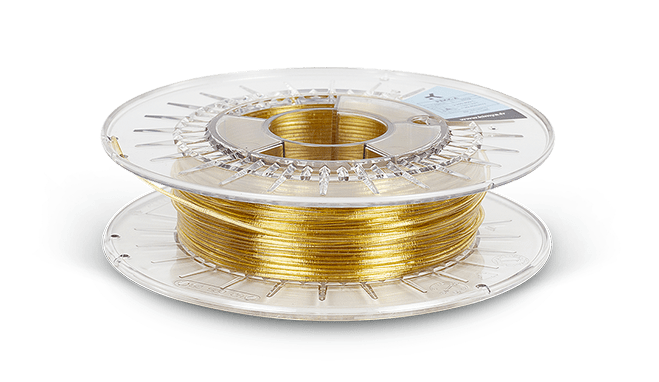PEKK is a high-performance polymer of a PAEK family with a wide application range.

PEKK is usually expected to be printed and left in an amorphous state. The user needs to take care of the storage conditions – PEKK is highly moisture sensitive. This material is often used as a metal replacement due to its exceptional properties.

PEKK is highly versatile: it combines chemical resistance, flame retarding properties and the mechanical properties which are one the highest of all known thermoplastic materials. The crystallization rate is slightly slower than PEEK, which makes it much easier to control and can lead to better layer adhesion. Thanks to the enhanced layer adhesion PEKK can reach even higher tensile strengths in each axis comparing to PEEK. This material is one of the best examples of high-performance polymers.
While printing this material on 3DGence INDUSTRY line printers you can use soluble supports. ESM-10 is compatible with this material.

PEKK Carbon is a thermoplastic polymer reinforced with carbon fibre which gives a high level of rigidity and heat resistance. Components produced from PEKK Carbon can be exposed to acids and hydrocarbons, like fuels and lubricants, and can be used as elements of engine housings.
PEKK Carbon offers a slower crystallisation speed than PEEK, which enables transformation at lower room temperatures, offering better interlayer adhesion and less warping. Parts are produced with an improved visual finish and better mechanical properties.

PEKK-CF is a unique carbon alloy from the PAEK family. It is a pseudo amorphous semi-crystalline material with a low Ether/Ketone ratio that offers excellent thermomechanical properties. Compared to PEEK, PEKK Carbon offers slower crystallisation speed enabling transformation at lower room temperatures, both plate and nozzle, offering better interlayer adhesion and less warping. The print process is easier to set up as well.
PEKK-CF also offers a high level of resistance to UV and high temperatures, in addition to excellent chemical resistance superior even to PEI. Heat deflection temperature is of 150°C. It features UL94 V0 flame retardance capability which is inherent for this material grade. PEKK-CF has a high dielectric stability, thus can be used as an insulator or electrical appliances housing material.
Low volume production
Additive manufacturing is frequently more cost-effective than other legacy manufacturing methods, allowing the rapid production of end-use parts at scale, reducing tooling and inventory costs and accelerating the time tp market.
End Use Parts
In many instances the mechanical properties and surface characteristics of 3D printed parts meet and exceed the customer’s expectation, allowing their use in the actual product.
Prior to launching mass production, engineering and designers benefit from 3D printing functional prototypes that can help verify fit, functionality and optimum integration with other components, accelerating the iterative development cycle and time to market.
We will help you to choose the right material